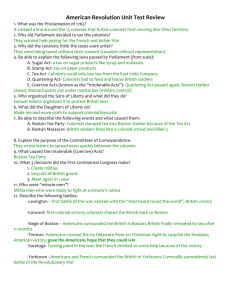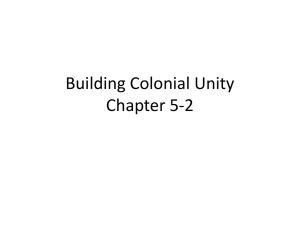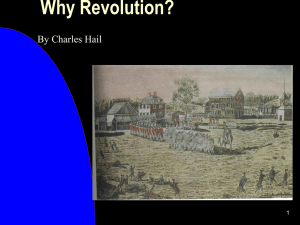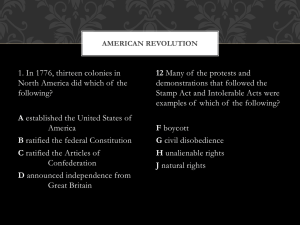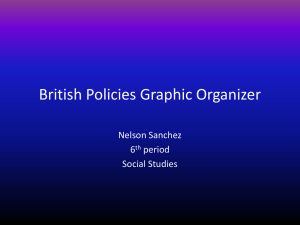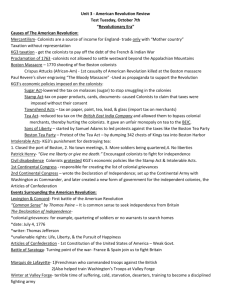STAAR Cards
advertisement
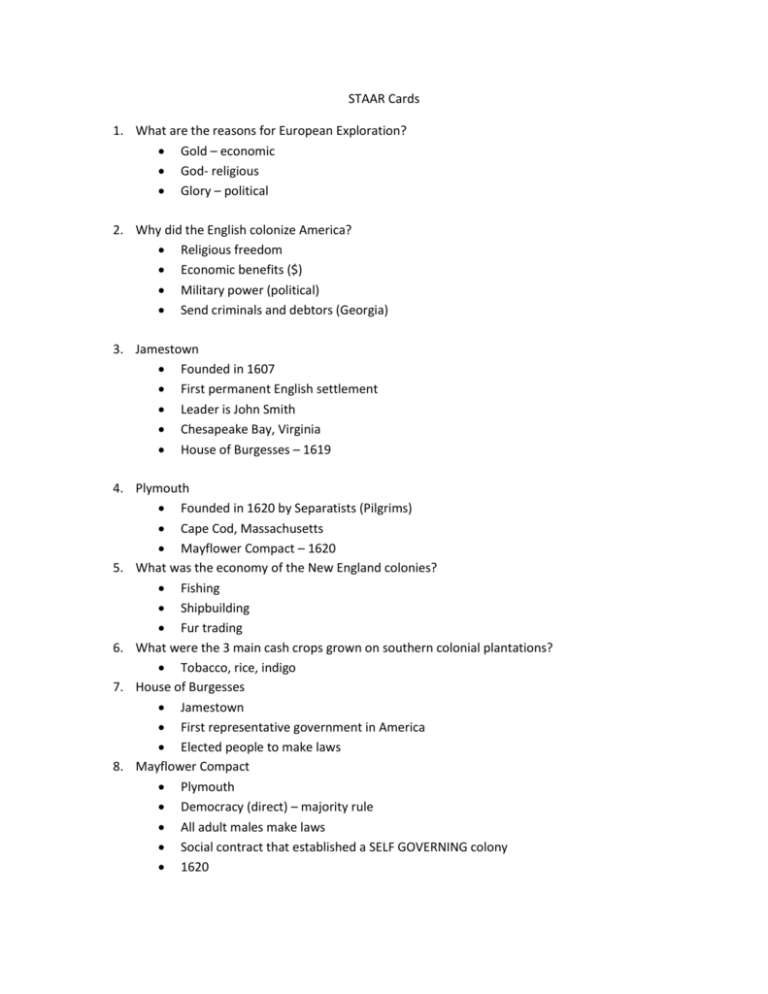
STAAR Cards 1. What are the reasons for European Exploration? Gold – economic God- religious Glory – political 2. Why did the English colonize America? Religious freedom Economic benefits ($) Military power (political) Send criminals and debtors (Georgia) 3. Jamestown Founded in 1607 First permanent English settlement Leader is John Smith Chesapeake Bay, Virginia House of Burgesses – 1619 4. Plymouth Founded in 1620 by Separatists (Pilgrims) Cape Cod, Massachusetts Mayflower Compact – 1620 5. What was the economy of the New England colonies? Fishing Shipbuilding Fur trading 6. What were the 3 main cash crops grown on southern colonial plantations? Tobacco, rice, indigo 7. House of Burgesses Jamestown First representative government in America Elected people to make laws 8. Mayflower Compact Plymouth Democracy (direct) – majority rule All adult males make laws Social contract that established a SELF GOVERNING colony 1620 9. Fundamental Orders of Connecticut Written by Thomas Hooker More men can vote (not just church members) Made Connecticut’s government more democratic 1st written constitution in the colonies 10. Colonial Regions New England – New Hampshire, Massachusetts, Rhode Island, Connecticut Middle – New York, Pennsylvania, Delaware, New Jersey Southern – Maryland, Virginia, North Carolina, South Carolina, Georgia 11. The French and Indian War aka The Seven Years War Fought between France and Britain over the Ohio River Valley Britain won Washington was a military leader Treaty of Paris 1763 ended the war France lost almost all their land in North America 12. Boston Massacre March 1770 5 people killed including Crispus Attucks Colonists used it as propaganda 13. Boston Tea Party December 11, 1773 Sons of Liberty dumped British tea into the Boston Harbor Protest against the Tea Act The punishment for the Boston Tea Party were the Intolerable Acts 14. Lexington and Concord 1775 “Shot heard round the world” First battles of the American Revolution 15. British Taxes Sugar Act – tax on molasses Stamp Act – tax on printed papers Tea Act – tax on colonial tea Townshend Acts – tax on imported goods like glass, tea, paper, lead 16. Other Causes of the American Revolution Proclamation of 1763 – no settlement west of the Appalachian Mountains Intolerable Acts- punishment for the Boston Tea Party Quartering Act – colonists had to house British soldiers Mercantilism – controlled colonial trade to benefit England No taxation without representation 17. Saratoga 1777 Turning point in the American Revolution France joins the Patriot side 18. Valley Forge Winter camp for Washington’s troops Many deaths due to frostbite and starvation Marquis de Lafayette trained the military 19. Yorktown April 21, 1781 Last major battle of the Revolution Cornwallis surrenders to Washington 20. Sons of Liberty Samuel Adams organized it Colonial protest group Responsible for the Boston Tea Party 21. Causes of tension between the Redcoats and the colonists: Quartering Act – colonists had to house British soldiers Writs of Assistance – soldiers could search colonists homes Boston Massacre – 5 colonists were killed (Crispus Attucks) 22. Declaration of Independence Second Continental Congress Written by Thomas Jefferson Adams, Jefferson, Franklin were all members of the Declaration of Independence committee July 4, 1776 23. Important People of the Revolution George Washington – commander of the Continental Army John Hancock – president of the Continental Congress (first to sign the DOI) Ben Franklin – persuaded France to become U.S. ally; negotiated Treaty of Paris Samuel Adams – leader of the Sons of Liberty Thomas Paine – author of Common Sense and The Crisis Patrick Henry – “Give me liberty or give me death” Wentworth Cheswell – African American who fought in the war Marquis de Lafayette- French General for the Patriots 24. Important People of the Revolution Part 2 Abigail Adams – “remember the ladies” John Adams – member of the Continental Congress Mercy Otis Warren – Patriot writer supporting independence James Armistead – African American Patriot spy Bernardo de Galvez – Spanish governor of the LA territory that sent supplies to the Patriots King George III – King of England during the Revolution Haym Salomon – Jewish immigrant that helped finance the Revolution 25. Treaty of Paris 1783 Ended the Revolution John Adams, John Jay, Ben Franklin negotiate it The United States is independent and gets all the land from the Atlantic Ocean to the Mississippi River 26. Triangle Trade Triangular shaped trade routes between Africa, Europe, West Indies and 13 Colonies The Middle Passage – Africans were transported in cruel conditions to North America to be sold into slavery Molasses, sugar, rum were other goods that were traded 27. Articles of Confederation Weaknesses: federal government couldn’t tax, regulate trade, there was no executive branch (president) or court system Strength: Northwest Ordinance – created an organized way to create new states 28. Constitutional Convention Virginia Plan – representation based on population New Jersey Plan – equal representation The Great Compromise – bicameral legislature Three-fifths Compromise – out of 5 slaves, 3 would count for taxation and representation 29. Constitution James Madison -“Father of the Constitution” September 17, 1787 Bill of Rights are the first 10 amendments Plan of government 30. Legislative Branch Congress makes the laws Senate – 30 years old – 2 per state House of Representatives – 25 years ol- based on 31. Executive Branch President, Vice President, Cabinet Enforces (carries out) the laws 35 years old Natural born citizen Commander in chief Appoints federal judges 32. Judicial Branch Supreme Court 9 justices – can serve for life Decide constitutionality of law 33. Popular Sovereignty People are the source of the government’s power 34. Republicanism People elect (vote) for their political representatives 35. Limited government The constitution limits the actions of government by specifically listing powers it does and does not have 36. Federalism Power is divided between the national government and state governments 37. Checks and balances Each branch limits the power of the other two branches Ex. President can veto a bill 38. Separation of Powers 3 different branches with 3 different jobs i. Legislative – makes the laws ii. Executive – enforces the laws iii. Judicial – interprets the laws 39. Individual rights Basic liberties and rights of all citizens that the government is obligated to protect Found in the Bill of Rights 40. Washington’s Farewell Address No political parties No foreign alliances 41. Washington’s Presidency Whiskey Rebellion Farewell Address Precedents: i. “Mr. President” ii. 2 terms 42. John Adams Presidency Federalist XYZ Affair Alien and Sedition Act 43. Thomas Jefferson’s Presidency Democratic Republican Louisiana Purchase – 1803 Lewis and Clark Embargo Act – didn’t trade with European countries Marbury v Madison – judicial review 44. James Madison’s Presidency War Hawks War of 1812 – caused by impressment i. Star Spangled Banner – Francis Scott Key ii. Battle of New Orleans iii. Treaty of Ghent iv. Increased American manufacturing v. International respect 45. James Monroe’s Presidency Era of Good Feelings Erie Canal Missouri Compromise Monroe Doctrine McCulloch v Maryland – national bank Gibbons v Ogden – interstate commerce Adams – Onis Treaty- Florida Annexed 46. Andrew Jackson’s Presidency – 7th President – Jacksonian Democracy Expanded voting rights (suffrage) Common man president Spoils System Nullification Crisis – Tariff of 1828 Indian Removal Act Worcester v Georgia Trail of Tears “Killed” the National Bank



